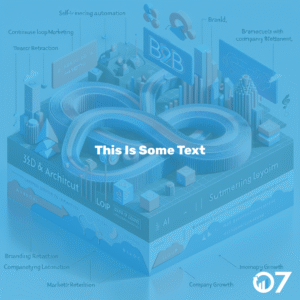Marketing campaigns are essential for SME businesses looking to expand their reach and enhance their brand visibility. By reading on, you’ll discover how to execute impactful strategies tailored for your business growth.
Understanding the Basics of Marketing Campaigns for SMEs
Embarking on marketing campaigns can seem daunting for SME businesses. However, mastering the fundamentals can transform this challenge into an exciting opportunity to grow your brand and connect with your audience.
Defining Your Goals: Setting Clear, Measurable Objectives for Your Marketing Campaign
The cornerstone of any successful marketing campaign lies in its goals. Objectives should not only be clear but also measurable, specific, achievable, relevant, and time-bound (SMART). For instance, rather than aiming for “increased brand awareness,” set a target to “increase website traffic by 30% over the next quarter.” This specificity provides a clear direction and makes it easier to measure success.
Furthermore, aligning these goals with your SME’s overall business strategy ensures that your marketing efforts contribute directly to the company’s broader ambitions. Whether it’s expanding into new markets, launching a product, or increasing customer loyalty, every campaign should take you one step closer to these overarching objectives.
Identifying Your Target Audience: Understanding Who Your SME Should Reach Out To.
Knowing your audience is pivotal. An in-depth understanding of your target demographic – including their interests, challenges, and behaviours – allows for more tailored and effective marketing efforts. Utilise market research and customer data to build detailed personas for your audience segments. This ensures your campaigns resonate on a personal level, increasing engagement and conversion rates.
Digital platforms offer invaluable tools for this analysis, providing detailed insights into customer interactions and preferences. Additionally, consider direct feedback through surveys or focus groups to further refine your understanding of your audience’s needs and expectations.
Budgeting Wisely: Allocating Resources for Maximum Impact.
A well-planned budget is your campaign’s lifeblood. It dictates how far your efforts can reach and influences the choice of channels and tactics. Start by reviewing past campaigns to identify what worked and where you can improve. This historical insight, combined with your current goals and audience understanding, will guide your allocation of resources for maximum impact.
Digital marketing, for instance, often offers a more cost-effective route for SMEs, with tools like social media, email marketing, and SEO providing both reach and precision at a lower cost than traditional media. However, the mix should reflect your audience’s preferences and habits. If your target market responds well to print advertising, it may be worth allocating a portion of your budget accordingly.
Digital Marketing Campaigns Strategies for SME Businesses
In the digital age, the right marketing strategies can catapult your SME into the spotlight, carving out a unique space in the crowded online marketplace. This section delves into three pivotal digital marketing avenues: social media, content marketing, and email campaigns, offering a blueprint for harnessing these tools to grow your business.
Social Media Mastery: Leveraging Platforms Like Facebook, Instagram, and LinkedIn.
The power of social media in today’s marketing landscape cannot be overstated. For SMEs, platforms like Facebook, Instagram, and LinkedIn offer invaluable opportunities to engage directly with your audience. The key is not just to be present but to be actively engaged with your community. This means regular posts, engaging content, and interactive dialogues with your followers. Tailor your content to each platform to maximise its impact; what works on Instagram may not suit LinkedIn’s professional environment.
Crafting a social media strategy starts with understanding your audience and what they value. From there, set realistic goals (increasing followers, boosting engagement rates) and measure your progress. Remember, consistency and authenticity are your allies in building a loyal following.
Content Marketing Essentials: Creating Valuable Content to Attract and Engage Your Audience.
Content marketing is all about providing value to your audience, establishing your SME as a thought leader in your industry. This can be through blog posts, videos, infographics, or podcasts – whatever format best suits your message and your audience’s preferences. The key is quality over quantity; every piece of content should offer insight, solve a problem, or fulfill a need for your audience.
Start with a content calendar to plan your topics and publication schedule. SEO research can guide your topic selection, ensuring you’re answering the questions your audience is asking. Remember, great content not only draws people in but also encourages them to share, extending your reach and amplifying your brand’s voice.
Email Marketing Campaigns: Personalizing Messages to Maintain Customer Relationships.
Email marketing remains one of the most effective digital marketing strategies, offering a direct line to your audience. The success of email campaigns lies in personalization and relevance. Use segmentation to tailor your messages to different groups within your audience, whether based on their purchase history, location, or interests. This personal touch increases the chances of your emails being opened and acted upon.
Automation tools can help manage your email campaigns, from welcome emails to targeted promotions, ensuring timely and relevant communication. Keep your emails concise, engaging, and always include a clear call to action. Remember, your emails should offer value, whether in the form of discounts, insights, or entertaining content.
Offline Marketing Campaigns for SMEs
While the digital world continues to evolve at a breakneck pace, offline marketing remains a powerful tool in the SME arsenal, offering tangible, personal touchpoints with your audience. This section explores how leveraging local events, print advertising, and networking can significantly enhance your brand’s visibility and deepen customer relationships beyond the digital realm.
Local Events and Sponsorships: Connecting with Your Community.
Participating in local events and sponsorships is a highly effective way to boost your SME’s presence within the community. It allows your business to demonstrate its commitment to local causes and connect with potential customers on a personal level. Whether it’s sponsoring a local sports team, participating in a charity run, or hosting a workshop, these activities can significantly enhance your brand’s visibility and reputation.
To maximise the impact of your involvement, ensure that your brand is prominently displayed and that you have a strategy for engaging with attendees. This might include offering free samples, conducting product demonstrations, or providing exclusive discounts. Additionally, follow up after the event with a thank you message or a special offer to convert attendees into loyal customers.
Print Advertising: Using Flyers, Brochures, and Posters Effectively.
Despite the rise of digital marketing, print advertising retains its charm and effectiveness, particularly for local SMEs. Flyers, brochures, and posters can be excellent tools for promoting new products, special offers, or events. The key to success lies in compelling design and strategic distribution. Your print materials should be eye-catching, clearly convey your message, and include a call to action.
Consider the placement of your print adverts carefully. High-traffic areas, local businesses, community centres, and events where your target audience is likely to be present are ideal. Tailor your message to the local context to increase relevance and engagement. Furthermore, integrating print advertising with your digital campaigns can create a cohesive brand experience for your audience.
Networking: Building Relationships Within Your Industry.
Networking is a fundamental component of any successful offline marketing strategy for SMEs. Building relationships with other businesses, industry influencers, and potential customers can open up a wealth of opportunities, from partnerships and collaborations to new customer leads. Attend industry conferences, seminars, and business expos to connect with like-minded individuals and promote your brand.
Remember, effective networking is about giving as much as taking. Offer your expertise, refer clients to other businesses, and support your peers. This approach not only builds your network but also establishes your SME as a reputable and valuable member of the business community.
Measuring the Success of Your Marketing Campaigns
Understanding the impact of your marketing efforts is crucial for continuous improvement and ensuring a strong return on investment. This section delves into how SME businesses can effectively measure the success of their marketing campaigns, focusing on analytics, audience feedback, and ROI evaluation. By adopting a data-driven approach, you can refine your strategies, better meet your audience’s needs, and ultimately drive more significant business outcomes.
Analytics and Reporting: Tracking Your Campaign’s Performance.
In today’s digital age, analytics provide a wealth of information about how your campaigns are performing. Tools like Google Analytics, social media insights, and email marketing platforms offer detailed data on user engagement, conversion rates, and much more. Start by setting up key performance indicators (KPIs) that align with your campaign goals, such as website traffic, lead generation, or sales conversions.
Regularly reviewing these metrics allows you to understand what’s working and what isn’t. Look for trends over time and compare the performance of different campaigns to identify successful strategies and areas for improvement. Don’t forget to drill down into the data to uncover deeper insights, such as which types of content your audience engages with most or the most effective channels for reaching your target market.
Feedback and Adjustments: Listening to Your Audience and Tweaking Your Approach.
Beyond quantitative data, qualitative feedback from your audience is invaluable. Surveys, customer reviews, and social media interactions can provide a deeper understanding of your audience’s perceptions and experiences. Pay attention to what they’re saying about your brand and your marketing efforts. This feedback is a goldmine for identifying areas for improvement and tailoring your approach to better meet your audience’s needs.
Actively seek out feedback through various channels and encourage open dialogue with your audience. When you make adjustments based on this feedback, let your audience know how their input has influenced changes. This not only improves your marketing strategies but also builds trust and loyalty with your audience.
ROI Evaluation: Assessing the Financial Impact of Your Marketing Efforts.
Ultimately, the success of your marketing campaigns comes down to return on investment (ROI). This measures the financial return from your marketing spend, helping you understand the profitability of your efforts. Calculate ROI by comparing the revenue generated from your campaigns against the costs involved in running them.
However, evaluating ROI isn’t always straightforward, especially for campaigns with long-term goals like brand building or customer loyalty. In these cases, consider additional metrics such as customer lifetime value or brand engagement levels. It’s also important to set realistic expectations for ROI, acknowledging that not every campaign will be a direct hit but each provides valuable lessons for future strategies.
In conclusion, mastering marketing campaigns is essential for SME businesses to thrive in today’s competitive landscape. By understanding the basics, leveraging digital strategies, embracing offline tactics, and measuring success effectively, SMEs can create impactful campaigns that drive growth and foster lasting connections with their audience.
Throughout this guide, we’ve explored various aspects of marketing campaigns tailored specifically for SMEs. From setting clear goals and identifying target audiences to utilising social media, content marketing, print advertising, and networking, each strategy plays a vital role in reaching and engaging with customers.
However, success doesn’t stop at implementation; it’s also about continual evaluation and adaptation. By regularly tracking analytics, listening to audience feedback, and assessing ROI, SMEs can refine their approaches, learn from their experiences, and optimise their marketing efforts for maximum impact.
- How can you tailor your marketing campaigns to better resonate with your target audience’s preferences and behaviours?
- What are some innovative ways you can integrate digital and offline marketing strategies to create a cohesive brand experience?
- How can you leverage data and insights from your past campaigns to inform future marketing decisions and drive better results?
For further insights and resources on enhancing your marketing efforts, consider exploring authoritative sources like HubSpot.
Remember, the journey to marketing success is ongoing, and we’re here to support you every step of the way. For more tailored guidance or to explore our services further, visit our blog, or reach out to us via email at info@07hm.co.uk or telephone at 01702 410663.
Let’s elevate your SME’s marketing together!






